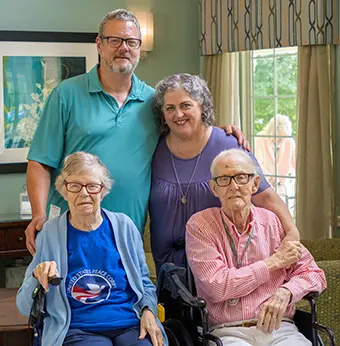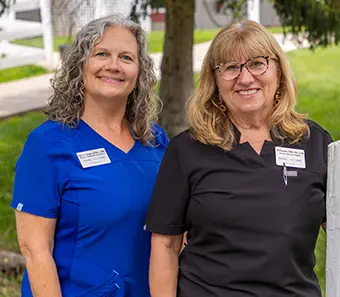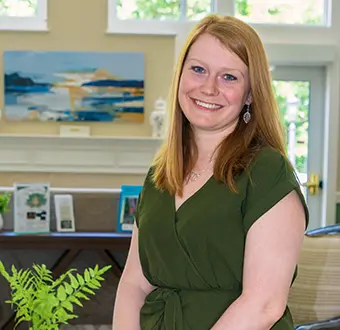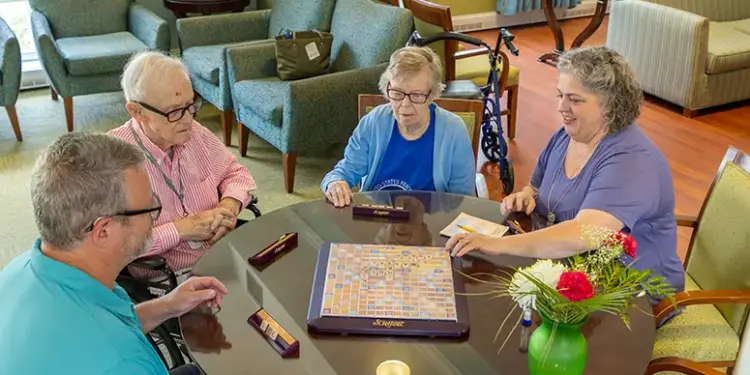by Erin Jones, photogrpahy by Nikola Tzenov
Teresa Barrett Dower doesn’t have to be reminded about her in-laws’ eventful younger days. Hal and Aileen Dower both served in the Peace Corps, building schools in Africa. As the couple grew older, Aileen became pragmatic. She was looking to the future, and downsizing meant distributing their treasures among the family.
The family was still in the research and discussion stage about planning the next steps in life when a health scare forced them to expedite the process. Hal took a fall and suffered a broken hip. He was hospitalized, then faced surgery and recovery in a rehab facility, all while the COVID-19 pandemic raged. He returned home to recover, but it quickly became clear that in-home physical therapy would not be adequate support. Teresa and her husband, Paul, were 45 minutes away in Mount Airy.
Teresa stepped up to the daunting task of researching the family’s options. This path would eventually lead to Lorien, an assisted living and health services facility in Mount Airy. The Dower family’s predicament is one that many families face, particularly as their aging family members require care beyond what their loved ones can give them.
Navigating Numerous Care Options
Jill Rosner of Westminster is a registered nurse, certified Aging Life care manager and the founder of Rosner Healthcare Navigation. Rosner had been a research nurse at the University of Maryland School of Medicine, working with patients at Carroll Hospital who had broken hips and studying the development of pressure ulcers, also known as bed sores. In her interactions with patient families, she noticed the same questions arising: What can we do if our loved ones can’t go home alone?

When the research study she was involved in concluded, she realized that she felt motivated to help those families and others like them. “People’s lives change drastically after a health crisis,” Rosner said. “Or sometimes people have dementia, and they can no longer live at home alone. I decided that this is what I wanted to do. I wanted to navigate people through the health care system.”
She founded Rosner Healthcare Navigation in 2007. Rosner helps people navigate the numerous care options available to them, as well as the complex health care system. When meeting a new client, Rosner, along with staff occupational therapist Timna Shaw, conducts an initial interview and assessment. They learn about the person’s medical history, take vital signs and assess their physical and cognitive health, in addition to conducting a safety and risk assessment of the home. Rosner says she rarely receives initial contact from clients directly but is often approached by family members or referred by elder care attorneys.
Taking A Proactive Approach To Care
However, families can take proactive preliminary steps to prevent a crisis: Get an advanced directive that documents the desired treatment plans. An advanced directive should be in place regardless of age or ability, as incapacitation can occur at any time.

“Whether it’s a slow, steady decline, [or] somebody’s in a car accident, you just don’t know what’s going to happen. Having those directives is step one. If something were to happen, you have somebody to step in and make decisions,” says Kelly Snyder, director of social work for Carroll Lutheran Village in Westminster.
Identify a power of attorney. Without a power of attorney, family members are often forced to petition for guardianship, a process that can be arduous and lengthy. Often, finances can be inaccessible during this period, causing financial strain.
For a power of attorney to take effect, the state of Maryland requires two physicians to certify an individual’s incapacity in writing. Involving physicians at every stage of decline can prevent delay, particularly in crises.
Involve a primary care physician from the earliest signs of physical or cognitive decline. A physician can also help determine whether a decline is permanent or temporary and whether it is due to a treatable medical condition. For example, a urinary tract infection, which is easily treatable, can sometimes cause delirium that could be mistaken for dementia.
What Financial Assistance Is Available?
In addition to Medicaid for qualifying individuals, state assistance may be available through programs such as the Senior Assisted Subsidy Program and
Medicaid’s waiver program, which includes Home and Community Based Services. Programs like these can often have a long waitlist, though. Kelly Snyder, director of social work for Carroll Lutheran Village in Westminster, advises getting on these lists early to avoid financial strain in a crisis.
Maryland Access Point, through the Maryland Department of Aging, provides guidance on navigating these programs. Snyder also recommends consulting with an elder care attorney when navigating these financial systems.
What Signs Should Family Members or Loved Ones Be Monitoring That Indicates Additional Care May Be Required?
The ability to manage medication is a key indicator of whether someone can continue to live independently. A family member or physician may be needed to help fill the pill box, or there may be confusion about what each medication is intended to treat.
In daily life, indicators may range from difficulty keeping up the home or yard to needing assistance bathing or dressing. Lapses in executive functioning, such as forgetting details like doctors’ appointments and managing finances, also indicate the need for additional support.
Other indicators to watch out for include social isolation, forgetting to eat, an increase in driving mishaps or getting lost. Even if someone remains cognitively capable, physical limitations may still make it challenging to live in a home. Stairs, bathtubs and trip hazards, such as rugs, are all potential risk factors to evaluate. Whether physical or cognitive support is needed, family members are often on the front lines of providing extra care. Snyder cautions that this solution can bring with it relational strain.

“It becomes hard when you’re the caregiver [in addition to] the child or the spouse and having to differentiate those roles,” Snyder says. “When you become the caregiver, it can take away from being the loved one.” Instead of assuming that family assistance is a long-term solution, Snyder advises beginning to research the options early.
“Even if you’re not quite ready for your loved one to go to assisted living, educating yourself and getting that information sooner rather than later [means that] if there is a crisis, you’re not putting so much more on yourself. In that moment, it’s hard to process and make decisions,” Snyder says.
When the Dower family faced these decisions, the initial solution was visits from Griswold, a home care service provider that offered three hours of care twice a week. Meanwhile, Teresa began researching assisted living options that would alleviate the 45-minute drive currently separating the family. She and Paul toured several facilities in Frederick, but in the end, they chose Lorien, just five minutes from their home.
“Assisted living doesn’t take away your independence, and I think that’s what people are so fearful of. If anything, it’s meant to promote and encourage that independence,” – Kelly Snyder
Teresa says they are happy with the choice of Lorien among their many options. In addition to the services they provide, her in-laws still enjoy making time for excursions that remind them of their former way of life. Hal prefers to get his hair cut at Great Clips rather than using the service Lorien provides, and Aileen enjoys grocery shopping rather than making a list for someone else to pick up.
It’s essential to consider what facilities offer not just at the time of enrollment but also in the future, as needs may change. Snyder notes the unique needs associated with memory care. “Depending on the care needs, there can be a difference between assisted living and memory care assistance living. Each one provides trained staff, but if you’re looking for assisted living for someone with cognitive impairment, a more specialized assisted living could be beneficial,” Snyder says.
Factors To Consider
When assessing the best option for her clients, Rosner considers their lifestyle, the most comfortable setting, the level of care required and their financial capabilities.
The latter of these considerations can be a weighty consideration for many.
Rosner has helped families navigate financial systems not only in Carroll County but also in several nearby counties. In her experience and estimation, in-home health care is often billed hourly, with rates ranging from $35 to $40. Assisted living can cost between $4,000 and $12,000 per month, while a nursing home level of care can range from $10,000 to $16,000 per month.
While concerns such as medical care and finances can rise to the top of the considerations when navigating transitions like these, there is also an emotional component to consider. Carroll Lutheran Village offers counseling and emotional support.
Although transitions like these can be stressful for all parties, family members need to acknowledge and honor the grief inherent in these life changes. That is Teresa Dower’s advice to others navigating this transition: “Realize that the person or people who are moving from independent living to assisted living, you need to be gentle with them. Realize that they are mourning a life that they’re giving up. It’s a very emotional process.”









